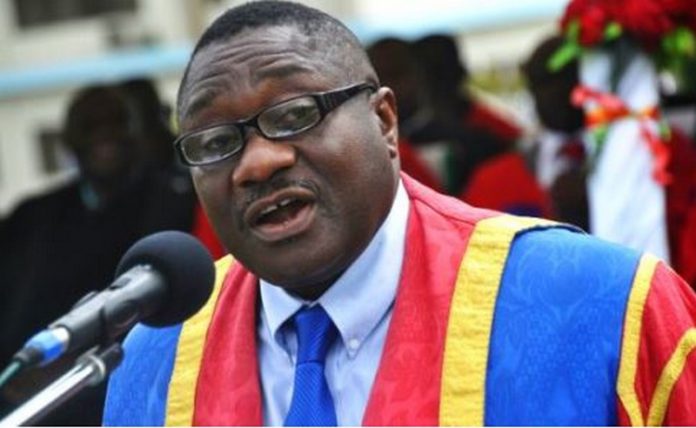The Supreme Court has struck out a suit challenging the reinstatement of Professor Mawutor Avoke as the Vice-Chancellor of the University of Education, Winneba (UEW).
The Supreme Court struck out the case on Tuesday (March 1, 2022), reports Graphic Online.
The plaintiff, Emmanuel Ansong Baah, a resident of Darkuman in Accra, who sued in his capacity as a Ghanaian, filed a notice to discontinue the case, which was granted by the court.
Baah was asking the Supreme Court to quash the decision of the Winneba High Court ordering the UEW to reinstate Prof Avoke.
Grounds
It was the case of the applicant that the case leading to Prof Avoke’s reinstatement was not properly filed and therefore the Winneba High Court has no jurisdiction to determine it.
The applicant argued that the case was filled out of time because it was filed four years after the said events leading to the sacking of Prof Avoke.
“That I have been advised and believe same to be true that since the application was filed out of time, the respondent (Winneba High Court) ought not to have entertained it since it was contrary to the rules,” the applicant said.
Again, the applicant is of the contention that a report by the Economic and Organised Crime Office (EOCO) which exonerated Prof Avoke of any wrongdoing was not properly before the Winneba High Court, and therefore the court committed an error when it relied on it for the judgement.
“For a document emanating from an agency of the state to be a legal document, at least it ought to have been signed, stamped and probably on the Letter Head of that institution but in the instant case, it was not the case,” the applicant contended.
Based on the above reasons, the applicant urged the Supreme Court to quash the decision of the Winneba High Court.
“The respondent (Winneba High Court) relying on the EOCO report to order the 2nd interested party (UEW) to reinstate the dismissed officers was erroneous and must not be allowed to stand by the apex court of the land,” the applicant argued.
Background
On February 2, this year, the Winneba High Court ordered the UEW to reinstate Prof Avoke.
The court, presided over by Justice Aboagye Tandoh, on Wednesday, February 2, 2022, also ordered the UEW to reinstate five principal officers of the university who were dismissed together with Prof Avoke in August 2018.
The five officers are Dr Theophilus Senyo Ackorlie, Finance Officer; Mr Frank Owusu Boateng, Deputy Finance Officer; Ms Sena Dake, Internal Auditor; Ms Mary Dzimey, acting Head of Procurement, and lng. Daniel Tetteh, acting Deputy Director of Works and Physical Development.
Per the orders of the court, Prof. Avoke is to be reinstated as V-C, while the five officers are to be reinstated to the same grade level they occupied before their dismissal.
It was the considered view of the court that the position of V-C of the UEW was currently vacant and, therefore, Prof. Avoke should go back to occupy it, while the other officers should be given other commensurate positions because their previous positions were currently being held by others.
Reasons
Justice Aboagye Tandoh held that the dismissal of Prof. Avoke and the five officers, coupled with the subsequent refusal of the UEW to reinstate them, was wrongful in law, unjust and against the tenets of equity.
According to him, the six persons had already been exonerated by the Economic and Organised Crime Office (EOCO), which investigated certain allegations of procurement malfeasance levelled against them
He also held that a three-member committee set up to investigate and amicably resolve the crisis that bedevilled the UEW had also recommended the reinstatement of the six persons after finding no adverse case against them.
The three-member committee, chaired by Justice Sir Dennis Dominic Adjei, a Justice of the Court of Appeal, had held that the dismissal of the six persons was illegal and, therefore, they must be reinstated.
Justice Tandoh ruled that it was unjust for the UEW to still refuse to reinstate the six persons when all investigations had cleared them of any wrongdoing.
The court gave the judgment after it upheld an application for prohibition and mandamus by one Samuel Kweku Ghartey.

